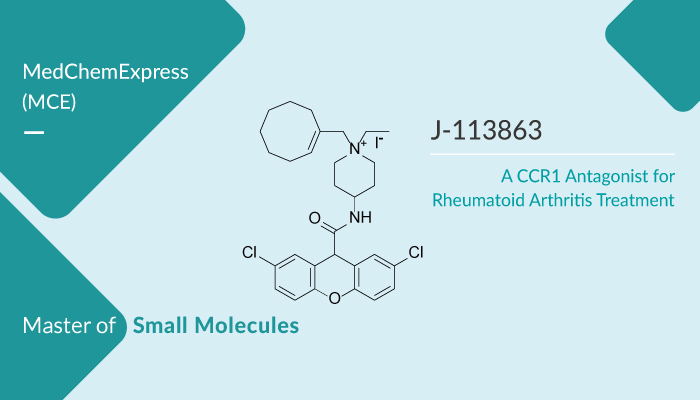The CC-type chemokine receptor 1 (CCR1) is a chemokine receptor of significant importance in human health. CCR1 is a protein that in humans is encoded by the CCR1 gene. Moreover, CCR1 exhibits significant constitutive activity leading to a variety of cellular responses. The chemokine receptor CCR1 is a member of a receptor superfamily that binds multiple CC-chemokines. Of these, the most representatives are CCL3/macrophage inflammatory protein-1α (MIP-1α) and CCL5. Furthermore, CCR1 is a potential target for the treatment of rheumatoid arthritis. Several nonpeptide CCR1 receptor antagonists that show high affinity for human CCR1 receptors
J-113863 is a non-peptide antagonist of the mouse receptor. In particular, J-113863 is a CCR1 antagonist. Importantly, J-113863 has IC50 values of 0.9 and 5.8 nM for human and mouse CCR1 receptors, respectively.
Up to now, researchers used J-113863 to explore the impact of CCR1 blockade in experimental arthritis and the underlying mechanisms. Treatment of THP-1 cells with J-113863 reduces background levels of THP-1 cell chemotaxis towards supernatants from mock-infected cells and medium controls. J-113863 does not inhibit mouse TNFα in vitro but induces a trend towards increased TNFα release in cells from synovial membranes of rheumatoid arthritis patients.

In vivo, researchers tested J-113863 in collagen-induced arthritis (CIA). Treatment of arthritic mice with J-113863 improves paw inflammation and joint damage and dramatically decreases cell infiltration into joints. J-113863 does not inhibit IL-2 or DTH but reduces plasma TNFα levels in LPS-treated mice. Surprisingly, J-113863 decreases TNFα also in CCR1 null mice.
All in all, J-113863 is a non-peptide antagonist of the mouse receptor for the blockade of CCR1 ameliorates murine arthritis and alters cytokine networks in vivo.